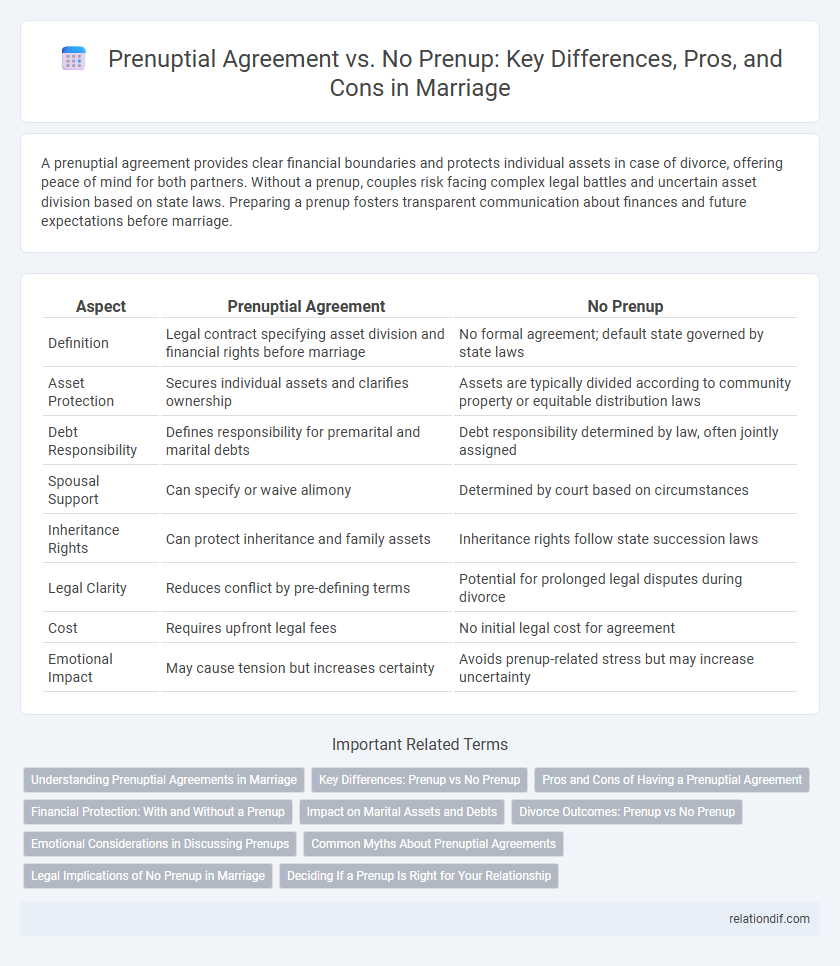A prenuptial agreement provides clear financial boundaries and protects individual assets in case of divorce, offering peace of mind for both partners. Without a prenup, couples risk facing complex legal battles and uncertain asset division based on state laws. Preparing a prenup fosters transparent communication about finances and future expectations before marriage.
Table of Comparison
| Aspect | Prenuptial Agreement | No Prenup |
|---|---|---|
| Definition | Legal contract specifying asset division and financial rights before marriage | No formal agreement; default state governed by state laws |
| Asset Protection | Secures individual assets and clarifies ownership | Assets are typically divided according to community property or equitable distribution laws |
| Debt Responsibility | Defines responsibility for premarital and marital debts | Debt responsibility determined by law, often jointly assigned |
| Spousal Support | Can specify or waive alimony | Determined by court based on circumstances |
| Inheritance Rights | Can protect inheritance and family assets | Inheritance rights follow state succession laws |
| Legal Clarity | Reduces conflict by pre-defining terms | Potential for prolonged legal disputes during divorce |
| Cost | Requires upfront legal fees | No initial legal cost for agreement |
| Emotional Impact | May cause tension but increases certainty | Avoids prenup-related stress but may increase uncertainty |
Understanding Prenuptial Agreements in Marriage
Prenuptial agreements clarify the division of assets and financial responsibilities before marriage, protecting individual property and reducing potential conflicts. Without a prenup, state laws govern asset distribution and debt responsibility during divorce, which may not align with the couple's intentions. Understanding the legal implications and benefits of a prenuptial agreement can facilitate transparent communication and secure financial stability in marriage.
Key Differences: Prenup vs No Prenup
A prenuptial agreement clearly defines asset division, debt responsibility, and spousal support before marriage, providing legal protection and reducing conflicts during divorce. Without a prenup, state laws govern property division and support, which may result in unpredictable outcomes and prolonged legal disputes. Prenups offer customized financial security, while no prenup relies on default legal frameworks that may not reflect individual preferences.
Pros and Cons of Having a Prenuptial Agreement
A prenuptial agreement offers clear asset protection and debt liability delineation, which can prevent lengthy legal disputes during divorce proceedings. Without a prenup, couples may face uncertain financial outcomes based on state laws that automatically govern asset division and alimony. Prenups may limit future financial flexibility and could create trust issues, but they provide security by defining property rights and spousal support in advance.
Financial Protection: With and Without a Prenup
A prenuptial agreement provides clear financial protection by outlining asset division and spousal support in case of divorce, minimizing disputes and legal costs. Without a prenup, state laws govern asset division, potentially resulting in unpredictable and prolonged financial settlements. Couples with significant assets or business interests benefit from the transparency and security a prenup offers, safeguarding individual wealth more effectively.
Impact on Marital Assets and Debts
A prenuptial agreement clearly defines the division of marital assets and debts, protecting each spouse's individual property and limiting financial disputes during divorce. Without a prenup, state laws govern asset and debt division, often resulting in equal or equitable distribution regardless of individual contributions. Couples without prenuptial agreements may face prolonged legal battles and uncertainty regarding financial responsibilities after separation.
Divorce Outcomes: Prenup vs No Prenup
Prenuptial agreements significantly influence divorce outcomes by clearly defining asset division, spousal support, and financial responsibilities, reducing litigation time and costs. Couples without prenups often face prolonged legal disputes and unpredictable rulings based on state laws, which can lead to greater emotional and financial strain. Studies show that marriages with prenups have higher success in amicably resolving divorce settlements, ensuring fair and transparent outcomes.
Emotional Considerations in Discussing Prenups
Discussing a prenuptial agreement often triggers complex emotional reactions, including trust concerns and fears of undermining marital commitment. Couples without a prenup may avoid these conversations to preserve emotional intimacy but risk future financial conflicts. Balancing open communication with sensitivity is crucial for addressing emotional barriers while ensuring mutual understanding of financial expectations.
Common Myths About Prenuptial Agreements
Many believe prenuptial agreements indicate mistrust, yet they primarily serve to clarify financial expectations and protect individual assets. Common myths suggest prenups only benefit the wealthier partner, but they equally safeguard both parties from potential future disputes. Understanding that prenups can address debts, property division, and spousal support helps dispel misconceptions and promotes informed marital decisions.
Legal Implications of No Prenup in Marriage
Couples who marry without a prenuptial agreement face default state laws that govern asset division, potentially leading to lengthy and costly legal disputes during divorce. Without a prenup, courts may classify property as marital or separate based on jurisdictional criteria, which can result in unintended financial consequences. This lack of clarity increases the risk of unequal asset distribution and prolonged litigation, emphasizing the importance of legal foresight in marriage planning.
Deciding If a Prenup Is Right for Your Relationship
Evaluating whether a prenuptial agreement suits your relationship involves assessing financial transparency, asset protection, and potential future disputes in marriage. Couples with significant assets, business interests, or children from previous relationships often benefit from the clarity and legal safeguards a prenup provides. Without a prenup, spouses rely on default state laws to divide property and debts, which may not reflect their individual wishes or intentions.
Prenuptial Agreement vs No Prenup Infographic

 relationdif.com
relationdif.com